A Journey Through Words
As an author in many different genres, I like to share a sample of several topic areas.
My “Journey Through Words” comes from a life-long fascination with language and writing. I began journaling in my native tongue – Swedish – when I received my first diary for my seventh birthday. I also wrote my first two “books” that same summer, and on the back cover of one of them I penciled “written by a world-famous authoress,” perhaps not an uncommon goal of a young girl who was already a voracious reader.
Later in Miami (where all of my diaries (around eighty today) moved with me, I had the good fortune of interviewing James Michener (yes, he of worldwide fame) for the major Swedish-language daily in Finland. I shared that little tidbit about my grandiose dreams (“world-famous authoress”) with him. As our visit ended and he walked me to the door of his home his otherwise stony face broke into a mischievous grin. “This is the first time my threshold has been crossed by a world-famous authoress,” he said. And we laughed in unison.
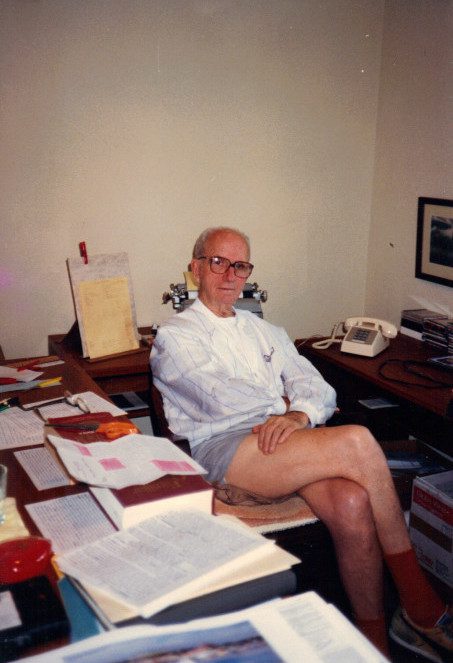
Although I grew up in a Scandinavian culture where compliments were few and far between, my high school writing teacher was an exception. His praise – that my pen was a divine gift (“gudabenådad” for those who’re interested in the original language) – kept me going throughout the years, in spite of the usual snickers by my classmates echoing in the background. Maturity has since given me a more balanced grip on reality, but I’ve never stopped writing. While I no longer seek fame and fortune I believe stories will always continue to be our legacy as human beings.
Consular Corps, Etiquette and Protocol, Album
CONSULAR CORPS OF MIAMI, AND BEYOND. Few entities suffer from as much misunderstanding as any group of consuls, and it begins with the fact that it is not a “corpse” with a hard p, regardless of how many times the term is misspelled and mispronounced. As I say in the book The Foreign Consuls Among Us: Local Bridges to Globalism, a consular corps (silent “ps”) is a body in and of itself and it does not require a separate action (like a vote by members) to come into being. Interestingly, when delegates from ninety-five nations met in Vienna in 1963 to adopt an international treaty on consular relations, they did debate the inclusion of a “corps” but – just as the diplomatic convention (Vienna, 1961) rejected references to a diplomatic corps – the term “consular corps” does not appear anywhere in the formally adopted document. But the misunderstanding goes on.
As they say, it’s all about education. To that end, I surreptitiously climbed my educational soap box when I penned a column for almost ten years: Esprit de Corps, for Miami Today – the Newspaper for the Future https://www.miamitodaynews.com Ostensibly, my purpose was to chat about the activities of our Consular Corps of Miami but I often managed to mention the most recent terms misused by the media or fellow consuls. Surprisingly, it wasn’t terminology that sometimes upset an ignorant colleague or newspaper reader but rather the fact that I didn’t include something generally belonging on the social pages (like who wore what to which event).
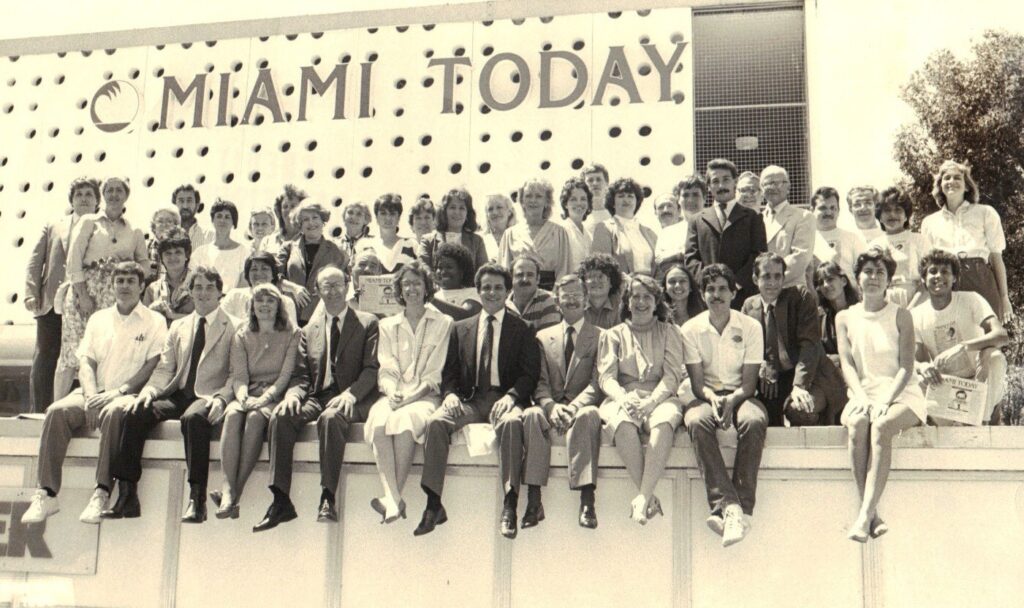
the roof of Miami Today, 1985
Since I sat on that roof top, above, I’ve continued as a contributing writer in a variety of venues. Check out Local Consuls are Bridges to Foreign Economies (2015) http://www.miamiherald.com/news/business/biz-monday/article45700416.html on how business and trade interests can benefit from the informational resources provided by local consulates. More recent feature stories include two publications: City Beautiful, Edition 2023-2024 (Alive and Thriving) and Global Miami, Dec. 2023 (Building Global Partnerships)
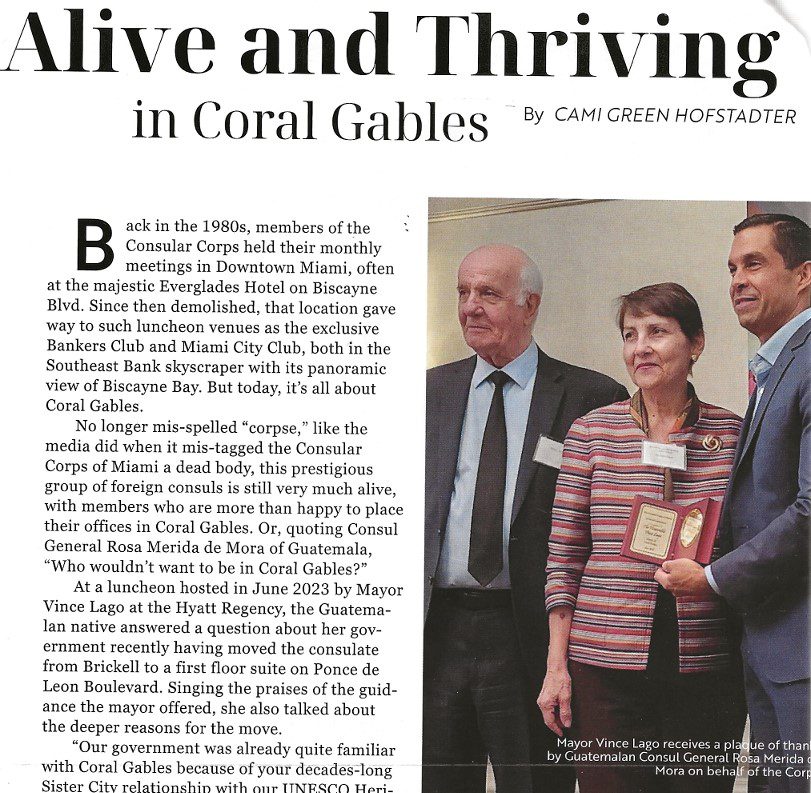
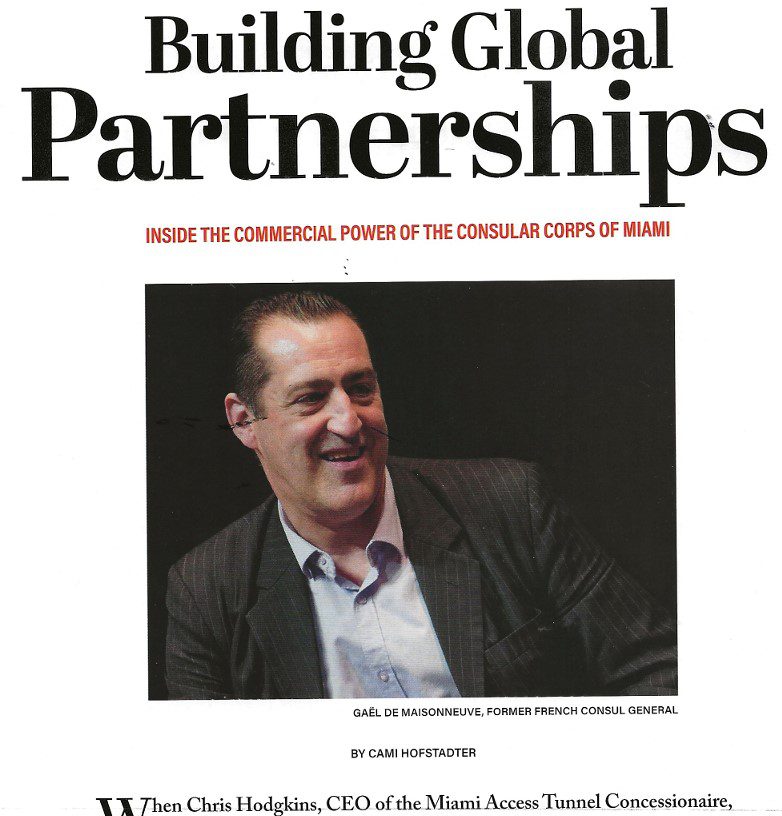
After my appointment (and the requisite U.S. State Dept approval) I became curious about when my local corps had “arrived” in Miami. Mostly, the 1950s was mentioned but nobody was quite certain. Being a researcher at heart, I began my investigation but immediately faced the challenges of repeatedly incorrect terminology in the printed material. Nevertheless, my hard work eventually resulted in a piece, A Corps of Foreign Consuls: Looking at its Miami Roots. https://www.historymiami.org in its Tequesta Journal (Dec. 2017). Regardless of what consular corps is of interest to you, the story shows how history plays its own tricks on all of us if we don’t use exact terminology.
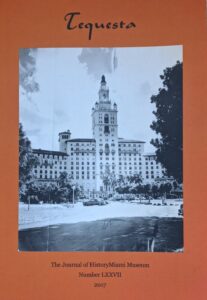
Gradually, the Miami Corps developed a notable presence through such events as the Annual Ball and Valentine’s party, where distinguished guests and luminaries were brought together with the foreign consuls:
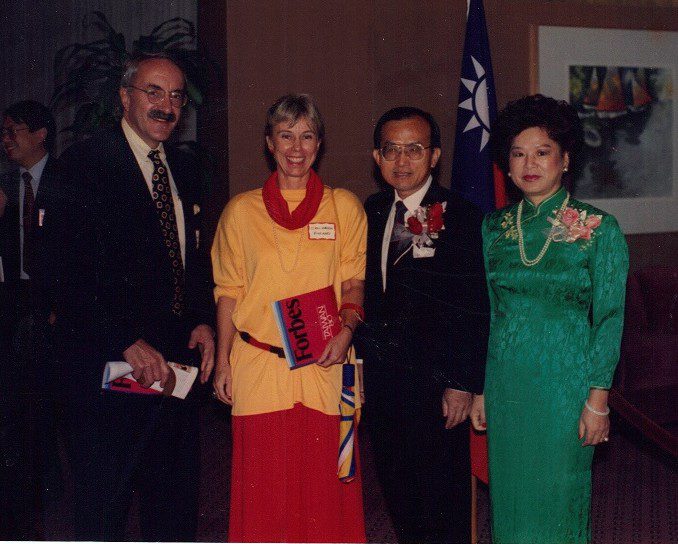
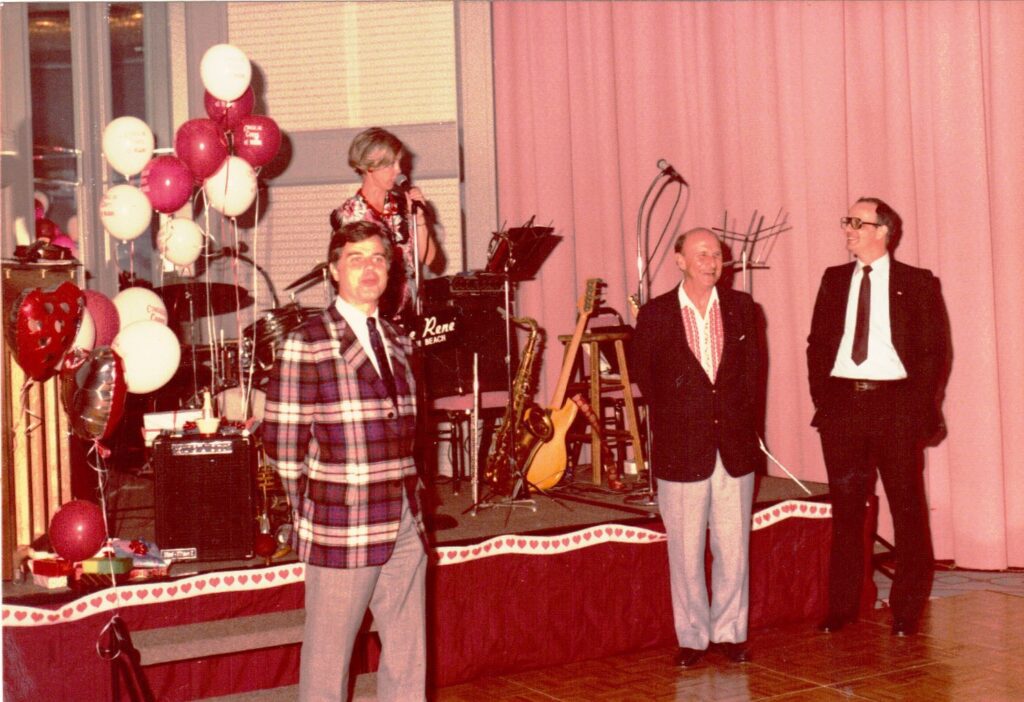
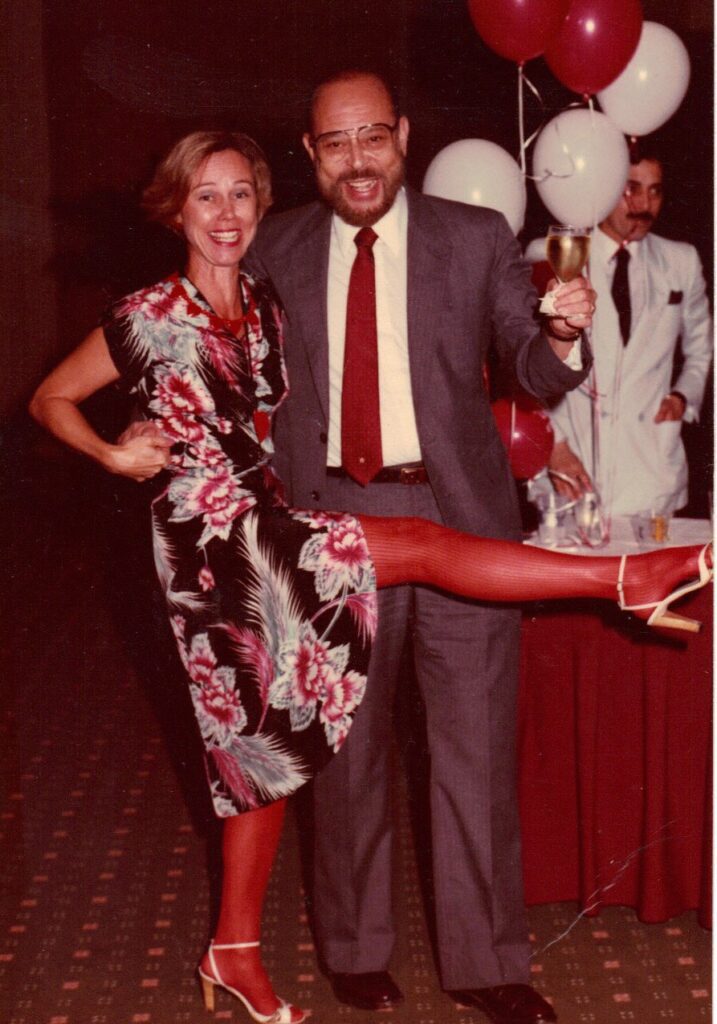
CONSULAR ETIQUETTE & PROTOCOL. Etiquette is usually guided by social customs found in traditional etiquette books; – most of us know how to introduce people to each other, for instance. Consular protocol on the other hand (not to be confused with the protocol for diplomatic receptions in our nation’s capital), is based on a ranking system established by the Vienna Convention only for career heads of post. In reality it’s difficult (often impossible) in our communities to ascertain what consul outranks whom.
Some U.S. states occasionally revise any existing guides to state protocol, but not always with foreign consuls in mind. George Firestone (Florida Secretary of State 1978-87) is often credited for updating Practical Protocol for Floridians to reflect emerging globalism in the areas specifically targeted by him: trade and culture. When Allen Morris, official state Historian and Clerk of the State of Florida, asked me to add a comprehensive chapter on consular protocol, he also asked me to include the role of consuls, a helpful tool in such instances where the proper address these foreign officials in our midst.
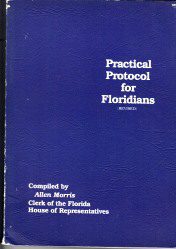
GALLERY, A PERSONAL RETROSPECTIVE
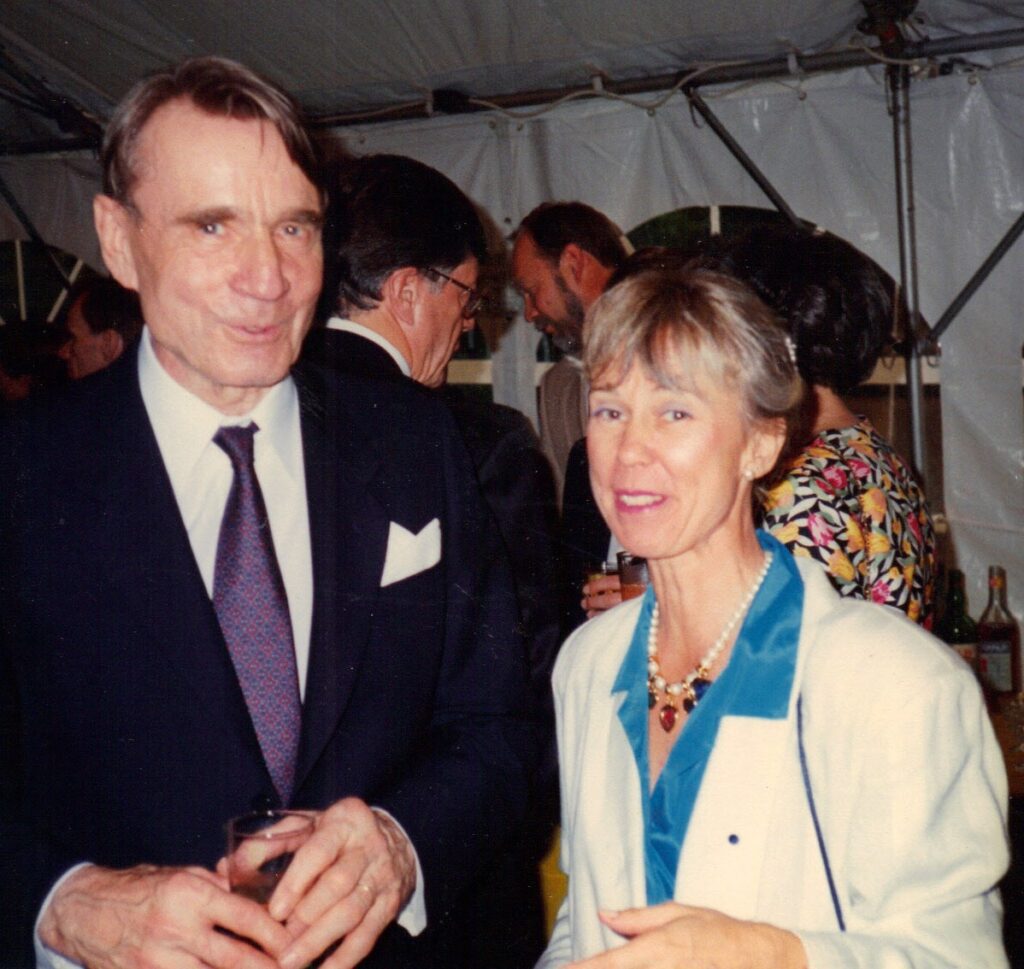
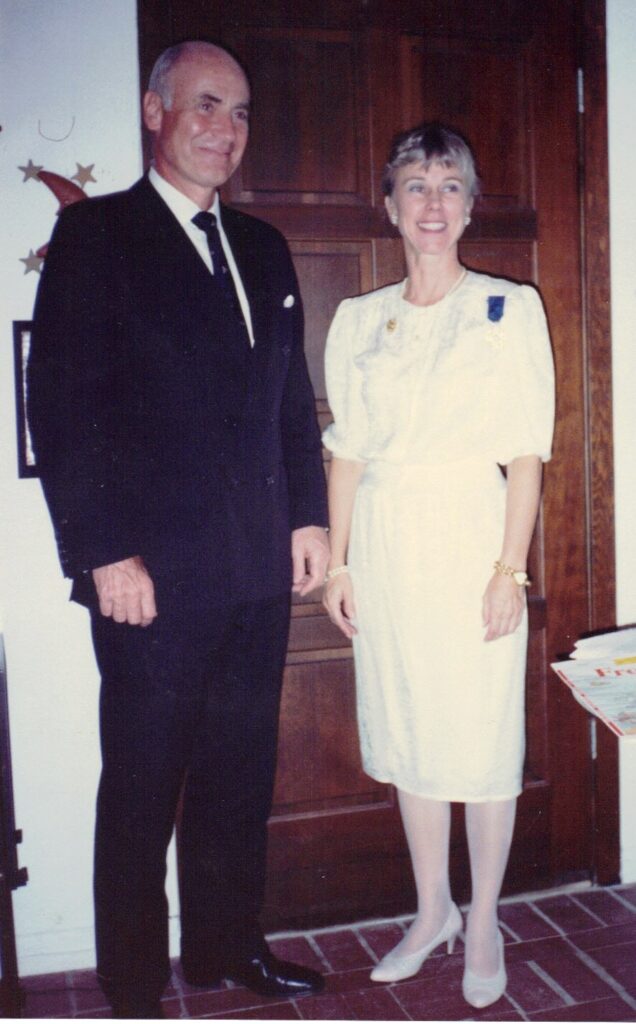
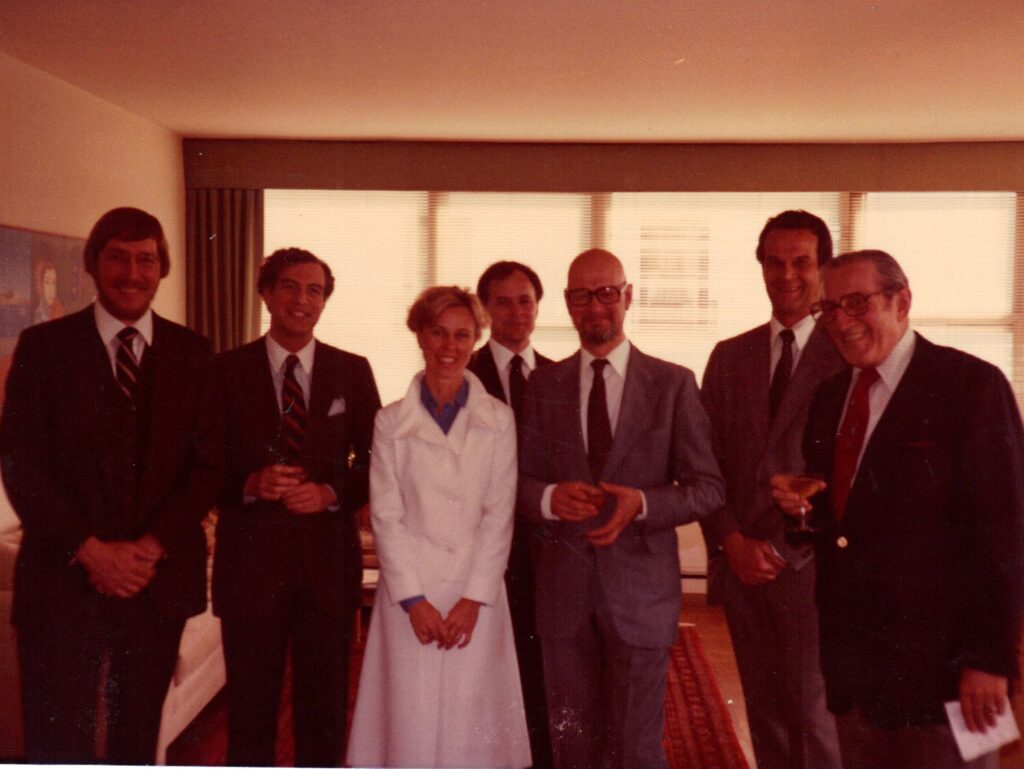
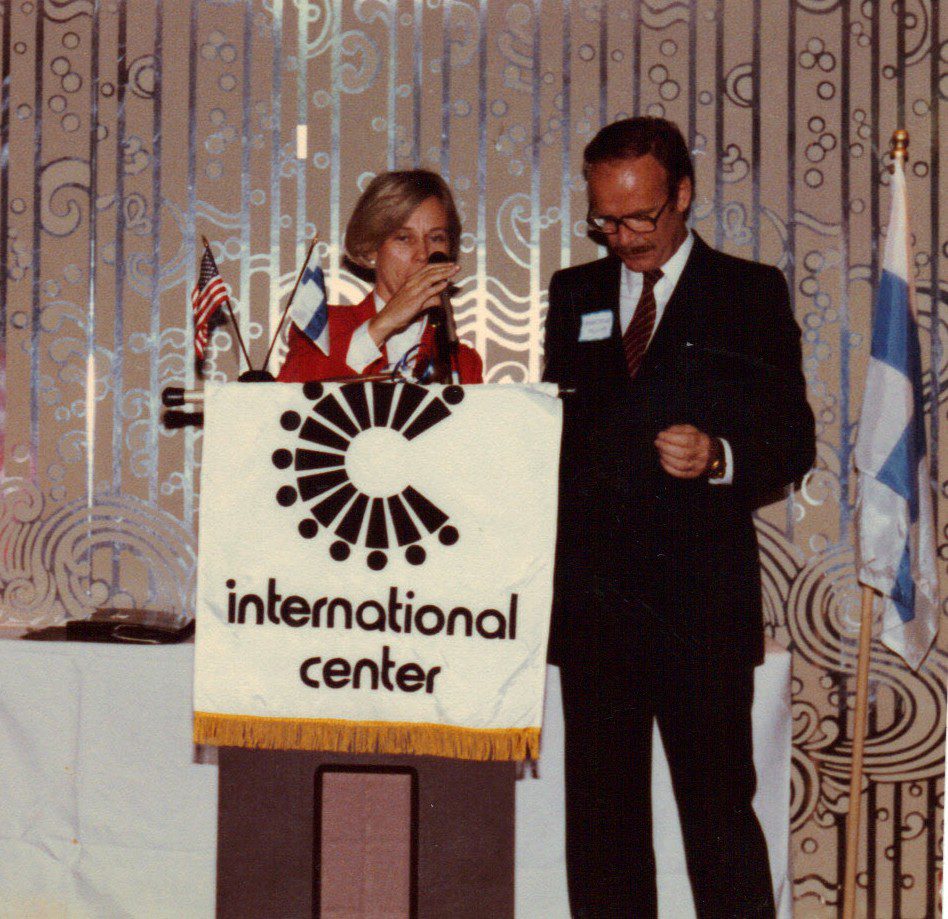
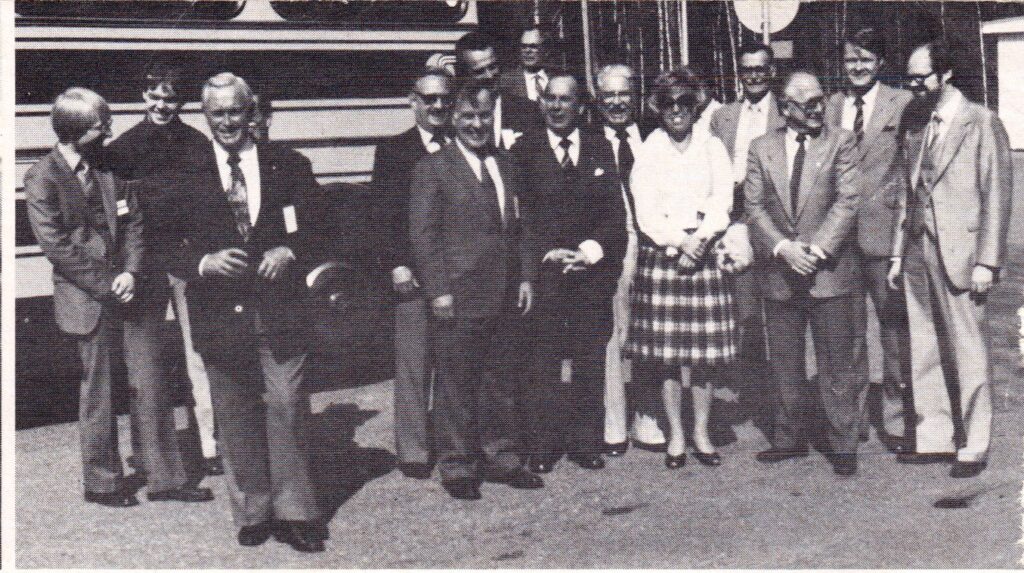
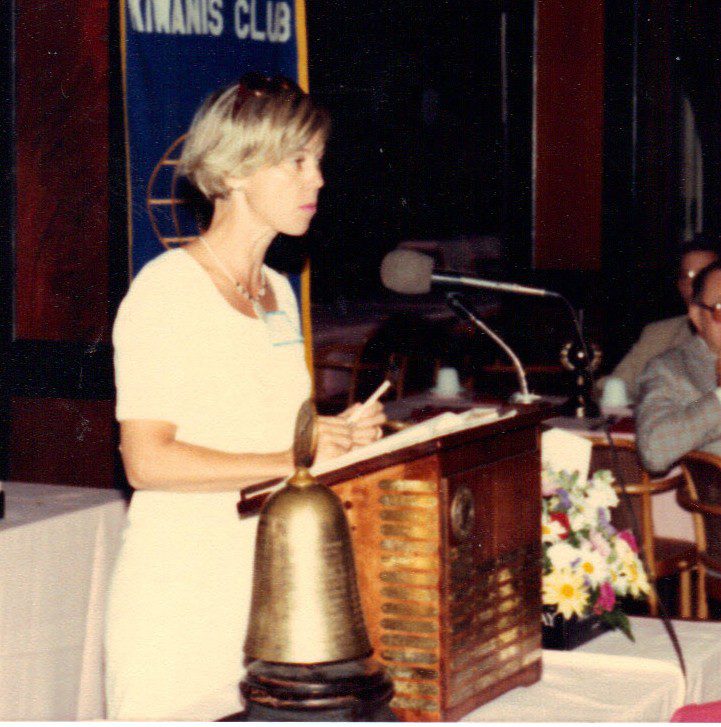
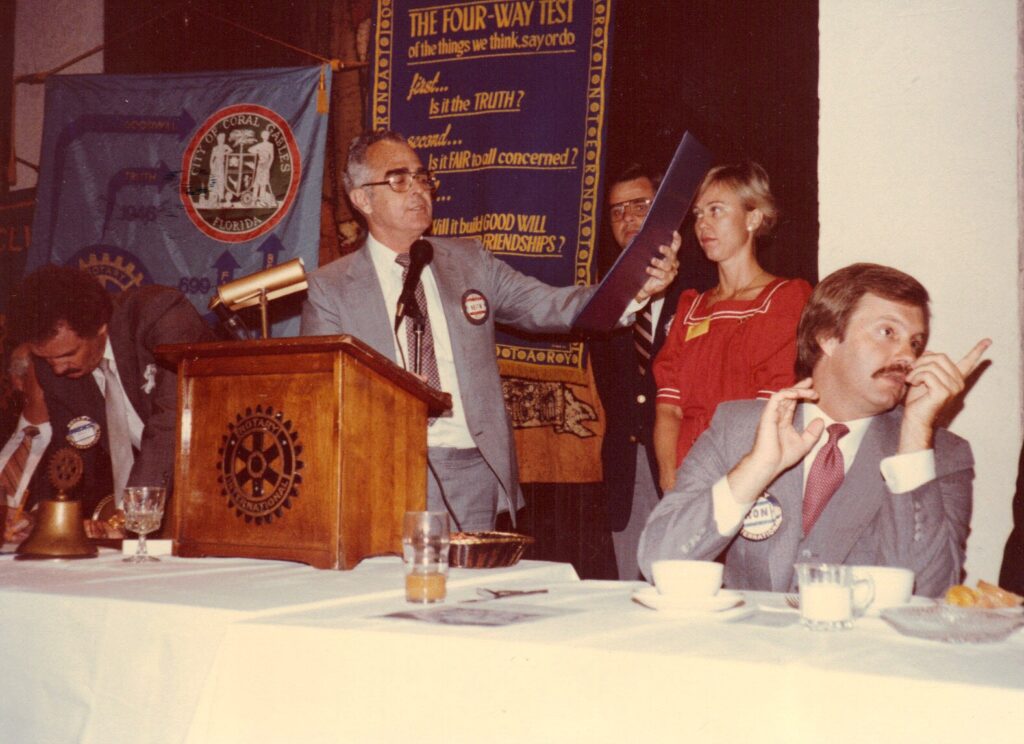

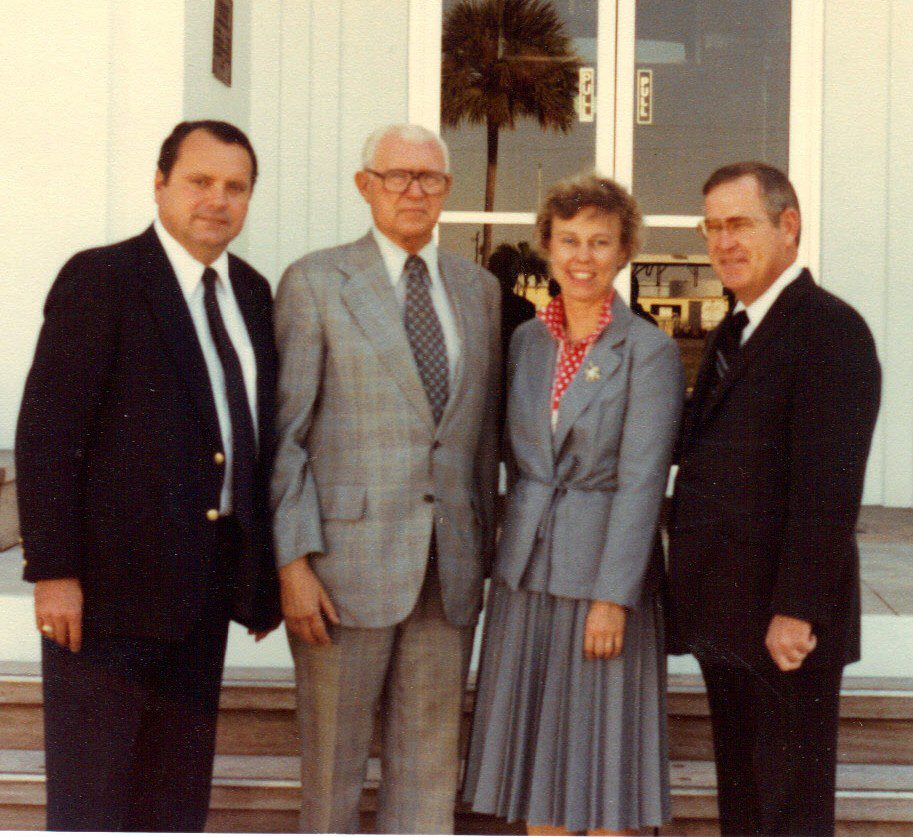
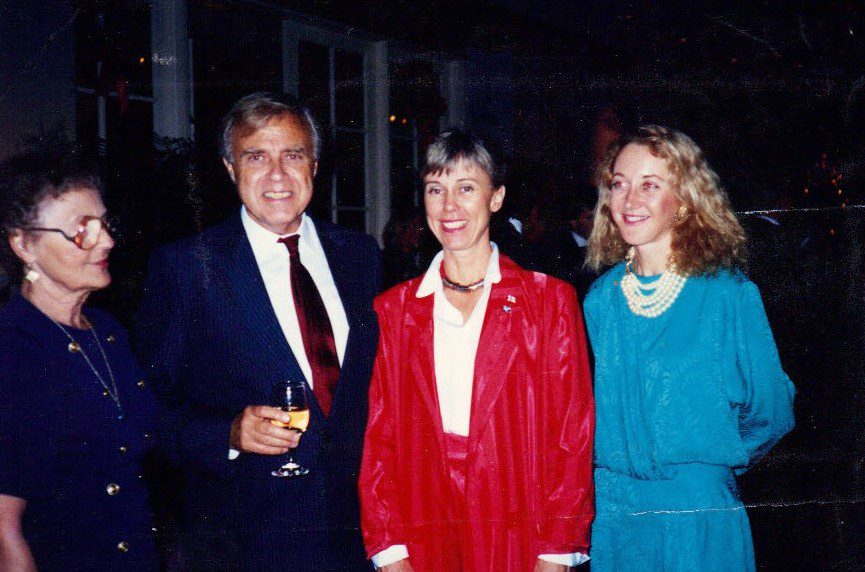
Tales2Inspire, Winning Stories by Me
Dr. Bernie Siegel (Author, A Book of Miracles) has this to say about the collection of inspiring stories (Lois W. Stern, Ed.): …”[stories] about compassionate people and animals can help us all to learn more about life and make our existence more meaningful.” https://www.tales2inspire.com/
2015 Winner: Left-over Feminism: My Lunch with Betty Friedan (The Crystal Collection).This collection is specifically targeted to make readers laugh. Thirty years after my Helsinki introduction to the iconic feminist, I arranged an in-person interview with her in Miami. Although my story has a serious side to it – as most humor pieces do – the outcome of my real-live interview tickles the funny bone with its observations of the inconsistency between our actions and beliefs.

2014 Winner: A Leap of Words (The Ruby Collection). When your beloved is in the throes of a serious illness you want to do everything in your power to maintain the same routines that have comforted him throughout his years as an obsessive-compulsive. But when you and he come from two different religious traditions, a new ritual with bedtime prayers creates a moral dilemma. This is a story about how it’s possible for someone who never liked change to find solace in the soothing rhythm of words he can’t understand.

2013 Winner: Maintenance for my Soul: The Man from Nowhere. (The Emerald Collection). The man appeared from nowhere to bring me a message of comfort and hope when I thought my 6-week old baby was going to die. Maybe this wasn’t just about coincidences, but about angels in human form. Whether you believe in angels in human form or simply the theory of synchronicity, this story shows what happens when we leave ourselves open to the mysteries of life.

Falling in Love With an OCDer
When I was swept off my feet by a man diagnosed with the Obsessive Compulsive Disorder (a so-called OCDer) I knew nothing about what’s also been called the Shame-based Disease. Maybe it’s true what some believe that they can’t possibly be lovable because of their peculiar behavior, but love does peculiar things. And I was a woman madly in love.
Some OCD sufferers aren’t even aware of anything unusual about their behavioral patterns, while others can be classified as hoarders, counters, orderers and checkers. To understand the man I loved I observed him, I studied the literature on OCD and its many different symptoms, and I attended a support group. Above all, I wanted him to know I loved him for who he was: a wonderful lover, protective of our common welfare, dependable. And funny. When I could see the humor and beauty in my circumstances, I was comforted and energized.
But soon I noticed how I’d begun to adjust my behavior to his increasingly bizarre actions. As his already-existing hoarding instincts became an obsession with all kinds of material (books, journals, newspapers, VHS cassettes) about the Holocaust I noticed my own overpowering desire to develop my own knowledge base on what happened to the Jews in Scandinavia during WWII. From there, the step wasn’t far to some of my other writings, below:
One of my first forays into going public with my life with an OCDer was a small piece in the International OCD Foundation Newsletter, Vol 23, no. 4 (Fall 2009):
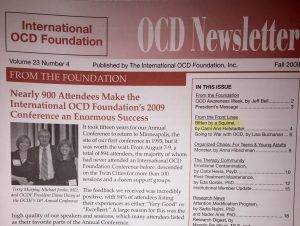

When life became unbearable with an OCDer I discovered my own obsession, My story in Golf Digest (Feb. 2012):
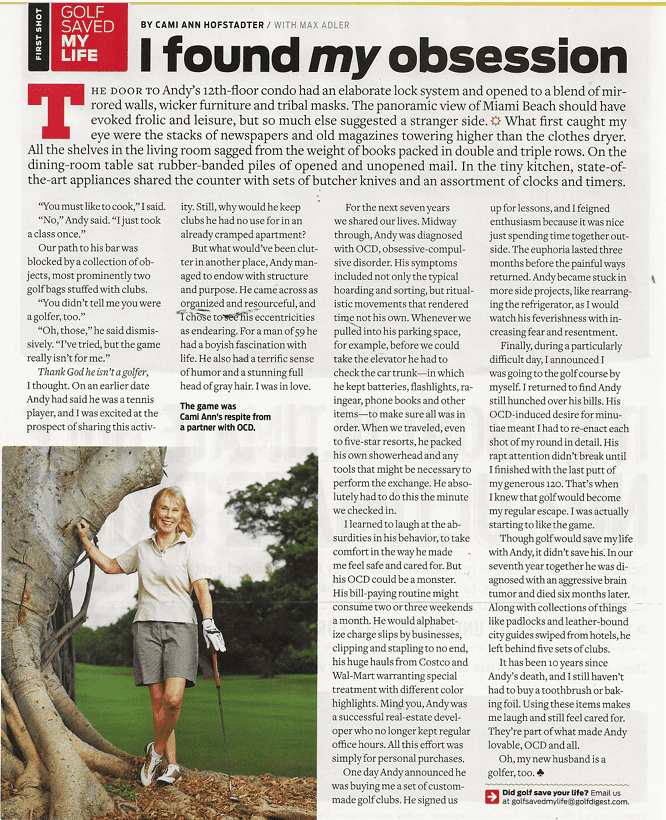
Two years later (2014) I won an award for A Leap of Words in the Tales2Inspire Ruby Collection A leap of words
Even though my years with a beloved OCDer isn’t a major part of my Amazon Bestseller The Yellow Star that Wasn’t, because people who attended my early lectures on the Jewish-Scandinavian topic often asked about the reason behind my fascination with it, the book cover belongs on this page of Loving an OCDer:

More Musings
I’ve selected the following few samples mainly because they are representative of a variety of sub-topics of the overall genre of human interest:
Hassles Aside, Amenities Make Condos Worthwhile. Miami Herald, (Jan. 26, 2003).
Condo-living can be a real hassle but there is a trade-off. My humorous essay speaks of how I avoided the condo-commandoes and developed my own coping skills.
Musings on “Gud som haver.” The Quarterly Vol. 3 (Fall 2009) https://www.swedishfinnhistoricalsociety.org/
Although this is a story about an ancient Swedish children’s prayer I approach it from the standpoint of the philosophy of translations. It’s intended to high-light the challenges faced by a anyone trying to transfer the meaning of one language to another. Those of us who’ve faced the demand for a perfect translation in another language will relate to the dilemma I present in this short story.
Bars and Cafés: the Coffee Culture in Finland. The Quarterly Vol 20, (Fall 2012) https://www.swedishfinnhistoricalsociety.org/
Coffee drinking has deep roots in Finland where it was first a prohibited pleasure. But when the coffee pot became a meeting point for parishioners welcoming visiting clergy, a distinct new social experience was born. Today, it has evolved into full-fledged coffee houses that compete with those on the rest of the Continent. And yes, even the ubiquitous Starbucks.
The coffee pot, below, brings back memories of my grandmother. The Swedish text says that a spot of coffee is the best drink on earth.
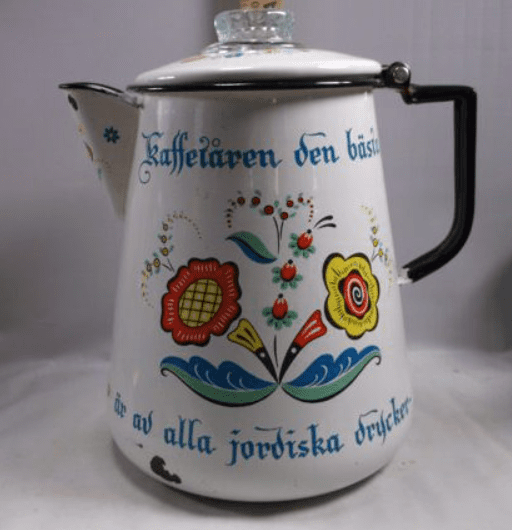
Leadership Skills at Meetings
I don’t remember a time when I wasn’t drawn to rules for appropriate social and civic interaction, whether in my consular or professorial role. Perhaps this comes from a Scandinavian culture that valued polite conformity and an upbringing steeped in matters of etiquette and protocol. Perhaps it has something to do with my training in the civil law system and its anchoring in written provisions.
Regardless, I became an expert in the rules for the democratic decision-making process (“parliamentary law and procedure”) in non-profit organizations and membership associations. I used these skills both as a leader myself (e.g., presiding over meetings) and by being a contributing member of many organizations (knowing that ultimately it’s the majority opinion of members that prevails). Among the organizations where I served in both roles, I like to mention ZONTA; the Finnish-American Chamber of Commerce; AALS (Association of American Law Schools) Section on Graduate Programs for Foreign Lawyers; Florida State Commission on International Education; and NAFSA: Association of International Educators. Also, I’m particularly proud over my service as national parliamentarian for two truly outstanding organizations: NAFSA and NCJW: National Council of Jewish Women.
When practicing proper procedure in their bar meetings, lawyers in leadership positions are true role models of democracy in action. For many years I also taught members of the Bar during its leadership days how to conduct a meeting in the most efficient way, using the democratic process of majority rule (How To Conduct a Meeting According to Robert’s Rules of Order and in View of Recent Case Law, Section and Committee Leaders Handbook, Florida Bar, beg., 1989).
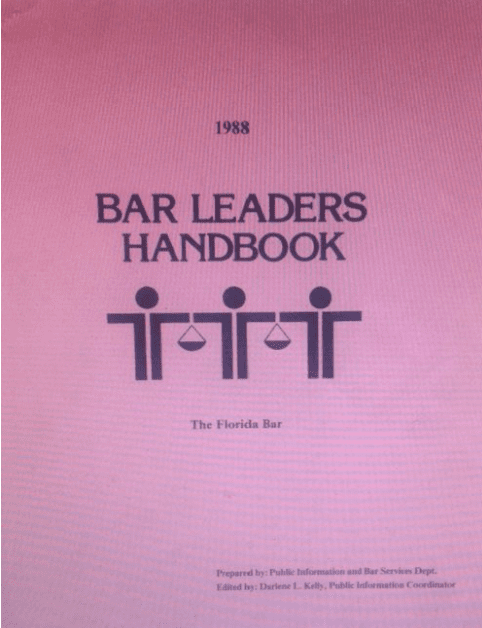
Bar Leaders Handbook, 1989
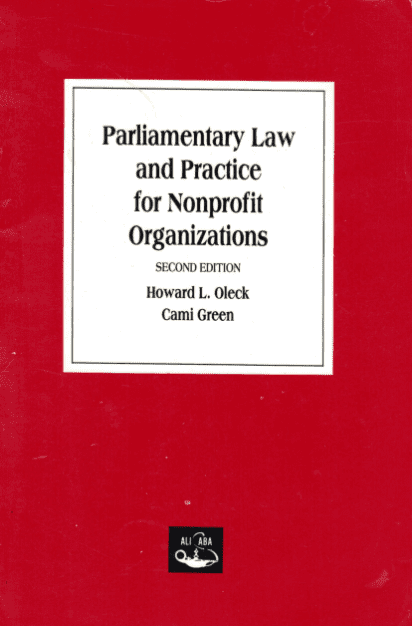
Parliamentary Law and Practice for Nonprofit Organizations, 2d ed.

Florida Bar Journal, 1988
A Sample of My Writings, with comments on how rules of procedure are the basis for majority-based decisions in a society that protects the minority in deliberate assemblies.
Throughout it all, teaching was always what I enjoyed the most. Among my hands-on classes I think back fondly of those I gave to high school students in their service clubs, the Honors College at Miami Dade College, sororities and fraternities at the University of Miami and Florida International University, to mention just a few. I believe that majority rule in meetings should be learned from an early age, so that future leaders will know how to reach decisions in an efficient manner that’s determined by the majority but protects the rights of a minority.
Some people see the similarities between rules for conducting meetings with the rules for consular etiquette and protocol. If so, I applaud you. It’s all about civil behavior in sometimes confusing circumstances.
Below is a Sample of My Writings in This Area, With Comments on how rules of procedure can be the basis for majority-based decisions in a society that protects the minority in deliberate assemblies:
Betwixt’N Between PIL and PLP: The Public Interest Lawyer and Decisions in Nonprofits
LXXII Florida Bar Journal No. 6 (June, 1998). Again, I draw attention to the fact that lawyers should be more proficient in the majority-based decision-making process; not just for their own protection but so that they can counsel clients.
A Quorum Problem in a Labor Union
51 Nat’l Parl. 3 (4th Quarter, 1990). Even though I discuss a dilemma in a labor union, the matter of a “quorum” is so commonly misunderstood that any reader can relate to my essay.
So You’re Afraid of General Robert?
31 University of Miami Veritas 6 (1990). During many years of consulting work, I became quite familiar with the common fear of Roberts Rules of Order. In this story I talk about that unfounded feeling.
Why Can’t Lawyers Be More Like Us?
XXXVI Parl. Journal No. 4 (October, 1996). A little bit tongue-in-cheek, I write about how law schools don’t teach parliamentary law and procedure and, yet, we look to the legal profession for advice on when a decision has been made in a way that stands up to a legal challenge.
